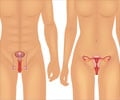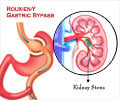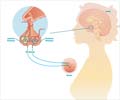Weight loss after obesity surgery reverses obesity-related hypogonadism and increases testosterone levels and sex drive in obese men.
Highlights:
- Hypogonadism condition (due to decreased testosterone) is reversed within one month in obese men who undergo sleeve gastrectomy, an obesity surgery
- Levels of testosterone and sex drive also increased in the subjects after the surgery
- Rapid and significant loss of fat mass right after the surgery prevents the conversion of testosterone into estrogen reversing hypogonadism.
Connection between Obesity and Hypogonadism
Hypogonadism is a condition in which the production of testosterone is reduced, whereas estrogen levels are elevated. The condition which affects obese men happens because the excess fat present in them interferes with the metabolism of the sex steroid; there is increased aromatization (conversion) of testosterone-like hormones known as androgens into estrogens within the adipose tissue.Hence, it follows that cutting down on weight should correct the hormonal imbalance, and cause a reversal of hypogonadism.
Earlier studies conducted to evaluate the effects of weight loss on male hypogonadism measures testosterone levels after a delayed period after the reduction of body fat. Hence, it was not known how soon the hormones begin to return to normal in human subjects.
Study
The goal of the current study was thus to investigate the levels of sex steroids immediately after rapid weight loss in a group of obese men who underwent bariatric surgery, so as to determine how quickly the hormonal levels changed.Twenty-nine obese men with an average age of 40.5 years and an average body mass index (BMI) of 43.4kg/m2 (considered morbidly obese which is defined as >40kg/m2) were chosen to be in the test group. The control group comprised of nineteen healthy age-matched, non-obese males.
A blood test was taken to assess the following parameters before and one month after undergoing a sleeve gastrectomy –
Total plasma testosterone -the major androgenic hormone responsible for the development of male reproductive tissues such as testes and prostate, and secondary sexual characteristics
Dihydrotestosterone (DHT) - the principal prostatic androgen sex steroid generated by reduction of testosterone
Estradiol (E2) - One of the 2 major biologically active estrogens that are involved in the regulation of menstrual female reproductive cycles and development of secondary sexual characteristics
Luteinising hormone (LH) - hormone essential for reproduction
Follicle-stimulating hormone (FSH) - hormone essential for reproduction
Sex hormone binding globulin (SHBG) - protein that binds tightly to estrogens, DHT, and testosterone and carries them throughout the blood
Prostatic-specific antigen (PSA) - protein produced by normal and cancerous cells; its levels are elevated in men with prostate cancer
Leptin - hormone predominantly made by adipose cells; it helps to regulate energy balance by inhibiting hunger
Other parameters measured before the surgery -
- Among the obese subjects 51.6% had hypogonadism
- Men with metabolic syndrome had lower plasma testosterone levels than those without metabolic syndrome
- BMI and waist circumference were more in subjects with lesser total testosterone and plasma LH levels, and vice versa
- Obese males had lower plasma testosterone than healthy subjects (10.8 vs. 15.7 nmol/L)
- The subjects also had higher estradiol levels, lower LH and FSH than healthy subjects
- There were no differences in the DHT and PSA levels between the two groups.
Results of the study
- Obese subjects showed a significant weight reduction, averaging 17.2 kg
- Proportion of obese subjects with hypogonadism fell to 11.6% compared to 51.6% before the surgery
- Average testosterone levels increased by 85%, and was higher compared to the healthy control group (18.9 vs. 15.7 nmol/L)
- Estradiol levels fell by 35%
- PSA levels rose by 70% which was attributed either due to the rapid increase in testosterone stimulating the prostate or due to the rapid reduction in plasma volume after weight loss; the researchers are planning to study further on this
Significance of the study
The study clearly demonstrates that the elevated hypogonadism in obese males is rapidly reversed within one month, after significant weight loss following bariatric surgery. Testosterone levels also increase significantly while estradiol levels fall. The reason behind this is the rapid and significant loss of fat mass and hence the decrease in aromatization of androgens to estrogens that typically occur in adipose tissue.The authors say that the low PSA levels observed in obese men could underestimate the true levels of PSA that would be seen if these men were normal weight. They say: "If you consider that obese males, as with all people with obesity, have higher prevalence of some type of cancer, including prostate cancer for men, this information could be of importance, since it could lead to doctors potentially missing cases of severe prostate disease in obese men."
Hypogonadism
Hypogonadism occurs when the body’s sex glands or gonads (testes in the males and the ovaries in the females) produce little or no hormones.The cause can be
Primary -when the ovaries and testes themselves do not function properly due to genetic and developmental disorders, autoimmune disorders, infections, radiation, surgery or trauma
Secondary or Central - when the hypothalamus and pituitary in the brain that control the gonads do not function properly; the causes include bleeding in the pituitary area, genetic problems, infections, nutritional deficiencies, an excess of iron, certain medications, rapid weight loss, tumors, radiation, surgery or trauma
Treatment is in the form of hormone-based medicines; estrogen and progesterone for girls and women, and testosterone for boys and men.Many forms of hypogonadism are treatable, and the condition has a good outlook.
Reference:
- Hypogonadism - (https://medlineplus.gov/ency/article/001195.htm)
Source-Medindia















